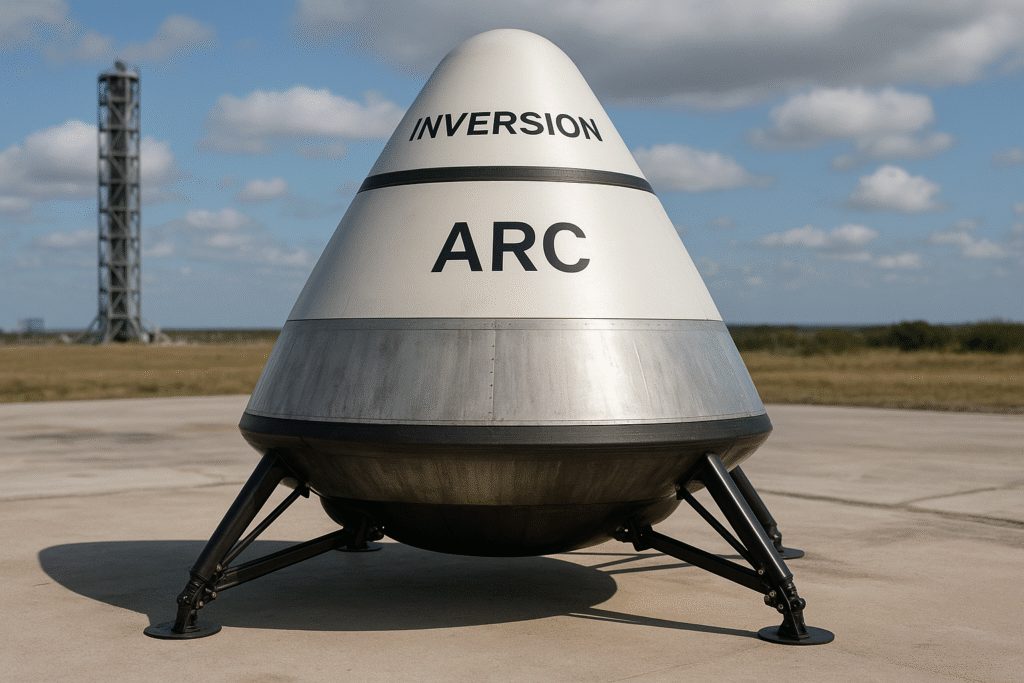By Harshit | October 6, 2025 | Los Angeles | 11:00 AM EDT
A New Era in Global Logistics
U.S. startup Inversion has unveiled a groundbreaking spacecraft called Arc, designed to deliver cargo to virtually any point on Earth within one hour. The company says the innovation could transform global logistics, humanitarian relief, and defense operations by enabling ultra-fast supply delivery from orbit.
Founded in 2021 by Justin Fiasetti and Austin Briggs, Inversion has already conducted four successful test flights of Arc. The spacecraft, capable of transporting up to 500 pounds (225 kilograms), is expected to begin deployment with the U.S. military in 2026 before expanding into commercial use.
Arc’s Unique Design and Capabilities
Unlike traditional aircraft or rockets, the Arc is a lifting-body spacecraft, engineered to maneuver through Earth’s atmosphere without wings or a runway. At eight feet long and four feet wide, the compact craft is designed for versatility and rapid deployment.
Key features include:
- Mach 20 re-entry speed (over 24,000 km/h), protected by advanced heat shields.
- Parachute landing system for safe, controlled descent in remote or disaster-hit areas.
- Orbital readiness of up to five years, enabling rapid launches at short notice.
- Payload versatility, including medical kits, food, drones, or military supplies.
By combining speed, autonomy, and precision, Arc aims to provide solutions where traditional logistics fail — from disaster zones to active conflict areas.
Military First, Civilian Next
The first applications of Arc will serve the U.S. military, which has long sought ways to quickly deliver aid and equipment to soldiers across the globe. Once proven in defense operations, Inversion plans to expand into humanitarian aid and commercial logistics.
Industry experts suggest that global shipping leaders like Amazon, UPS, and DHL could one day integrate orbital cargo delivery into their supply chains for time-sensitive, high-value goods.
Challenges and Considerations
While the Arc spacecraft signals a leap forward in logistics, several challenges remain:
- Cost efficiency: Space delivery must compete with air and maritime transport to scale globally.
- Regulation: International frameworks are needed to govern orbital cargo delivery and airspace use.
- Sustainability: Growing numbers of vehicles in low Earth orbit may increase congestion risks.
Despite these obstacles, Inversion argues that the life-saving potential of rapid delivery in medical crises, natural disasters, or war zones outweighs the risks.
Industry and Global Impact
According to analysts, Arc represents one of the most practical approaches to orbital logistics attempted so far. By keeping payloads small and focused on urgent deliveries, Inversion is avoiding the pitfalls of large-scale aerospace projects.
Some experts even compare Arc’s potential to the container shipping revolution of the 20th century, which transformed world trade.
Looking Ahead
As Inversion prepares for its 2026 rollout, the Arc spacecraft is drawing attention from defense agencies, humanitarian organizations, and global logistics companies. If successful, the ability to move critical supplies from orbit to Earth in less than an hour could redefine how nations and corporations respond to emergencies and manage supply chains.
With Arc, Inversion is betting that space-based logistics will move from science fiction to everyday reality — changing the very fabric of global delivery.

